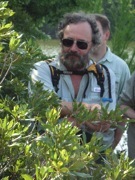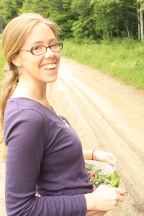
Green Deane
Green Deane – I’m a life-long Greek bachelor with a degree in music and graduate studies in communications. In short, I’m paid to play and write. I’m the author of many articles and two books — under my English name — “1001 Facts Somebody Screwed up” and “1001 More Facts Somebody Screwed up.” Odd facts: I don’t own or watch television, and I am, through one grandparent, a descendant of a Salem witch — Susanna North Martin — and a member of the Mayflower Society. I am not a vegetarian, a common assumption. This site is for my friends and others who are green but don’t know much about greenery.
Hobbies include gardening, cooking, collection cast iron cookware, dancing, canoeing, public speaking, kayaking, cast netting, fishing, biking, and hiking in Greece when ever possible, and of course foraging for wild foods and other unusual edibles. I’ve planted over 12 dozen different kinds of edible plants — cultivated and wild —on my small suburban lot in Central Florida and I maintain a year-round 20’ by 20’ garden. On my cul-de-sac I am the only one without a lawn of decapitated grass, much to my neighbors’ collective horror… I think of it as green diversity. Lastly, I am a musician and a writer, not an editor. If you see a typo or something else wrong, please let me know. – Deane Jordan/Dinos Tsapatsaris

Emily Ruff – Florida School of Holistic Living
Emily Ruff, Director of the Florida School of Holistic Living, is a community herbalist and health educator who has practiced the art and science of plant healing for over a decade. Her studies have taken her around three continents, where she has studied under indigenous healers of many traditions.
Ms. Ruff inherits a strong background in gardening and botany from her family, including several generations of small farmers and botanists. The roots of her study came in childhood wandering the wilderness of Florida with her botanist father, learning latin names and botanizing, and digging in the soil with her grandfather, an urban farmer, to cultivate nourishment for her family.
Her journey into herbalism continued as she apprenticed with a curandero in Guatemala while living abroad. Upon returning to the United States, she completed apprenticeships with many admired Western herbalists, including Rosemary Gladstar and George D’Arcy, in between visits abroad to study under medicine men and women of many traditions. She continued her path in academics, studying ethnobotany at the University of Central Florida, and studying flower essences extensively with the Bach Foundation. Her work has also taken her to the woods of Central Florida, where she lived off the grid and applied the principles of holistic living in an experiential research setting.
Emily is an international speaker and is currently serving her local community as a board member of the Homegrown Local Food Cooperative and of Slow Food Orlando. She has dedicated much of her work to preserving medicinal plants and their eco-systems as a member of United Plant Savers, and her recent research and publication work focuses on biodynamics, bioregionalism, and biorhythmic-influenced cultivation and healing. She is past-president of the Herb Society of Central Florida, and is a published author whose writing is frequently found in regional publications, including regular publications as Gardening Columnist of Edible Orlando and Green Editor of Velocity Magazine. She is recognized by membership in several professional organizations in the herbalism and holistic health field, and lectures throughout Florida to groups, organizations, garden clubs, and schools.
Before joining the school, Ms. Ruff enjoyed a successful career in journalism, and helped establish four non-profit organizations which remain active and thriving today. She traveled extensively teaching environmental justice and fair trade workshops around the country, and served as a US representative to numerous international environmental, fair trade, and social justice conferences throughout the world.
Today, Emily maintains an urban homestead and herb farm with her family and practices her joy spending her days immersed in the plant world. She delights in being part of the awakening of her students, and is honored to share in service as a guide along their path. Her classes are heart-filled, informative, and fun, and seek to create a bridge between the teachings of our ancestors and the technology of our modern world.

Maribou Matthews
Marabou Thomas – Forest Gardening Permaculture class in at the Florida School of Holistic Living.


Sharing my personal experience with poke sallet, as I am reading “Eat the Weeds” (most excellent guide).
I went as a girl with my maternal grandparents many, many times over the years to gather big bunches of poke out in the North Georgia and Atlanta area fields and roadsides. I also gather it as an adult (in OH, KY, IN, FL, AL, S. GA) and have prepared it as my grandmother taught me, and done it healthier, as well. These are not childhood memories that may be confused, I assure you.
My grandparents were taught to strip the leaves off of the stems, boil them. Drain them, then boil a second time, draining again. In a cast iron skillet (though you can use any frying pan or wok), heat up a dollup of bacon grease. Put the cooked poke in the pan, break an egg into the greens, stir it all up and serve. It’s honestly delicious. You can add pepper or salt, but if you use bacon grease, salt is not needed.
As an adult, I don’t usually cook with bacon grease, but I discovered that a good pat of butter or margarine works just fine, and you can use the Jamon powdered seasoning you find in the Mexican/Latin food section of your grocery stores for the pork flavor. Don’t forget the egg. You can get really carried away and use only egg whites, but the healthier you make the dish, it’s less scrumptious. I imagine a variation with smoked ham hocks would work fine, too.
There is not another green that can touch it when cooked in these ways. My friend, Pam, occasionally gathers the young, green shoots and sautees them in olive oil with a sprinkle of pepper and salt, but while delicious, that makes me a little nervous as no boiling is involved.
My grandmother told me that I can substitute spinach in the traditional way she made poke, and I have done that, but it does not have that same amazing flavor.
It’s not been uncommon for me to gather it, boil and drain it (twice), and then freeze it for future cooking with egg and butter or butter substitute.
I never fooled with the berries except to make a dye or ink for fun.
Thanks!